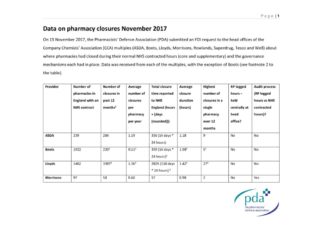The PDA does not believe there is any shortage of pharmacists available for locum work or employment. However, our members have told us that some providers are “sharing” a single pharmacist between two pharmacies in certain locations – and at least one of the pharmacies is closed during some of its normal hours of operation.
Prompted by these concerns, the PDA submitted a FOI request to the head offices of the CCA multiples (ASDA, Boots, Lloyds, Morrisons, Rowlands, Superdrug, Tesco and Well) about where pharmacies had closed during normal NHS contracted hours (core and supplementary) and the governance mechanisms each had in place. Data was received from each of the multiples, with the exception of Boots (see footnote 2 in the downloadable PDF below). In total the CCA multiples closed an estimated 5,878 times in a 12-month period when they would normally be open to the public (this is an estimate due to the data provided by Lloyds – see footnote 3 in the downloadable PDF below).
click to download the below PDF
Regulation 29 of The National Health Service (Pharmaceutical and Local Pharmaceutical Services) Regulations 2013 sets requirements where a temporary suspension of pharmacy services is required due to circumstances beyond the control of the contractor. Our members were concerned that some of the pharmacy closures were within the control of the contractor involved.
The GPhC’s “Standards for Registered Pharmacies” state “Responsibility for meeting the standards lies with the pharmacy owner. If the registered pharmacy is owned by a ‘body corporate’ (for example a company or NHS organisation) the superintendent pharmacist also carries responsibility. Pharmacy owners and superintendent pharmacists have the same set of responsibilities; a corporate owner does not avoid responsibility by employing a superintendent. Both are fully responsible for making sure that the standards are met.”
The standards require:
2.1 “There are enough staff, suitably qualified and skilled, for the safe and effective provision of the pharmacy services provided”
4.1 “The pharmacy services provided are accessible to patients and the public”
4.2 “Pharmacy services are managed and delivered safely and effectively”
The causes of the closures will be multifactorial, but whatever these are, the data appear to demonstrate a lack of resilience and insufficient rigour in the system to ensure the public can always access pharmacies at the time it expects and pays for. It will be appropriate in some circumstances to close the pharmacy on patient safety grounds, but we believe the reasons closures are happening should be examined, to check for common themes. If patients can’t access pharmacy services at the times specified in their NHS contracts, it calls in to question the effect on patient safety and care. There appears to be little consequence at an organisational level for failing to open to the public during NHS contracted hours. In addition, it appears from our efforts that there may not be any central oversight of national trends relating to pharmacy closures. NHS England did not hold, centrally, the data obtained by the PDA.
One might have expected such issues to be detected during contract monitoring visits, but the Department of Health has acknowledged that few on-site visits are happening due to capacity issues. Further, the data for some providers may suggest non-reporting of some closures. Where that is suspected, pharmacy visits may be able to detect non-reporting by comparing the hours logged in the Responsible Pharmacist record book with NHS contracted hours.
Our FOI request revealed that the closures are reported by the businesses themselves, and from the data available to the PDA, it appears that the reports submitted don’t often reflect any fault on the part of the business. This appears to be a weakness in the system; it may be against the interests of managers to report the fault as being on the part of the business, although it is the business which has responsibility for opening.
We would like to see better oversight and control in relation to such issues, and a more detailed investigation in to the root causes of pharmacy closures. Such an investigation, to achieve balance, would need to receive accounts from locum and employee pharmacists – whose views could potentially provide useful intelligence to the NHS.
